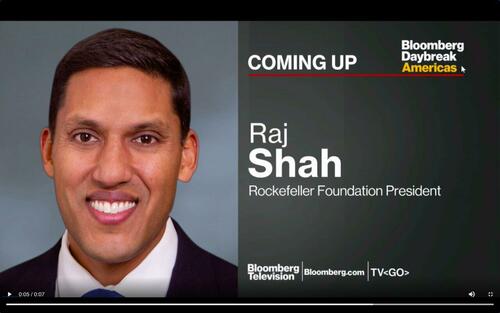Rockefeller Foundation President Rajiv Shah told Bloomberg Television’s David Westin a “massive, immediate food crisis” is on the horizon.
Shah provides what could be a timeline for the next global food crisis that could begin “in the next six months.”
He said global fertilizer supply disruptions caused by the Russian invasion of Ukraine would have an “even worse” impact on the crisis, slashing crop yields worldwide.
Shah said debt relief and emergency aid for emerging market countries are needed to mitigate the effects of the food crisis.
Shah’s appearance on Bloomberg is interesting because of the foundation’s repetitive talk about the need for the global food supply to be reset to a more sustainable one. The foundation has closely aligned views with the World Economic Forum (WEF), advocating for a ‘global reset‘.

WEF founder Klaus Schwab famously said in early 2020, months after the virus pandemic began, “The pandemic represents a rare but narrow window of opportunity to reflect, reimagine, and reset our world to create a healthier, more equitable, and more prosperous future.”
While Schwab and other global elites have been calling for a global reset, Rockefeller Foundation’s managing director of Food Initiative Sara Farley has echoed the same message.
Farley’s note published on WEF’s website titled “How to reimagine our food systems for a post-COVID world” outlined the need to “redesign supply chains with nutrition and human health in mind.”
Rockefeller Foundation’s senior vice president of Food Initiative Roy Steiner recently said, “the world is spending far too much on foods that are bad for people and bad for the planet.”
And what could Steiner likely be referring to? Ah yes, possibly cattle farming and how it uses massive amounts of natural resources, such as water and feed, to produce meat. WEF has advocated the need for the global food supply to inject insects into human diets.
Shah’s timeline for the next food crisis is an ominous warning that elites will use the events as a perfect opportunity to implement their plan to begin the transformation of the food supply system. Meat becomes a delicacy for the rich while the working-poor are stuck eating insects and berries. The great reset is well underway.
Watch the interview here (fwd to 34:30).
Republished from ZeroHedge.com with permission










Sign up on lukeunfiltered.com or to check out our store on thebestpoliticalshirts.com.